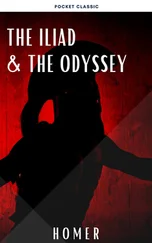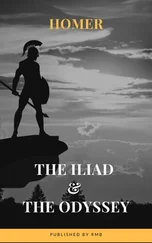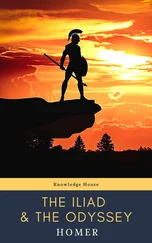John Milton - The Epic Poems Anthology - The Iliad, The Odyssey, The Aeneid, The Divine Comedy...
Здесь есть возможность читать онлайн «John Milton - The Epic Poems Anthology - The Iliad, The Odyssey, The Aeneid, The Divine Comedy...» — ознакомительный отрывок электронной книги совершенно бесплатно, а после прочтения отрывка купить полную версию. В некоторых случаях можно слушать аудио, скачать через торрент в формате fb2 и присутствует краткое содержание. Жанр: unrecognised, на английском языке. Описание произведения, (предисловие) а так же отзывы посетителей доступны на портале библиотеки ЛибКат.
- Название:The Epic Poems Anthology : The Iliad, The Odyssey, The Aeneid, The Divine Comedy...
- Автор:
- Жанр:
- Год:неизвестен
- ISBN:нет данных
- Рейтинг книги:4 / 5. Голосов: 1
-
Избранное:Добавить в избранное
- Отзывы:
-
Ваша оценка:
- 80
- 1
- 2
- 3
- 4
- 5
The Epic Poems Anthology : The Iliad, The Odyssey, The Aeneid, The Divine Comedy...: краткое содержание, описание и аннотация
Предлагаем к чтению аннотацию, описание, краткое содержание или предисловие (зависит от того, что написал сам автор книги «The Epic Poems Anthology : The Iliad, The Odyssey, The Aeneid, The Divine Comedy...»). Если вы не нашли необходимую информацию о книге — напишите в комментариях, мы постараемся отыскать её.
This collection includes:
–The Iliad and The Odyssey by Homer
–The Aeneid, by Virgil
–The Divine Comedy, by Dante Alighieri
–Venus and Adonis, by William Shakespeare
–Paradise Lost and Paradise Regained, by John Milton
The Epic Poems Anthology : The Iliad, The Odyssey, The Aeneid, The Divine Comedy... — читать онлайн ознакомительный отрывок
Ниже представлен текст книги, разбитый по страницам. Система сохранения места последней прочитанной страницы, позволяет с удобством читать онлайн бесплатно книгу «The Epic Poems Anthology : The Iliad, The Odyssey, The Aeneid, The Divine Comedy...», без необходимости каждый раз заново искать на чём Вы остановились. Поставьте закладку, и сможете в любой момент перейти на страницу, на которой закончили чтение.
Интервал:
Закладка:
Tell me now ye Muses that dwell in the mansions of Olympus, who, whether of the Trojans or of their allies, was first to face Agamemnon? It was Iphidamas son of Antenor, a man both brave and of great stature, who was brought up in fertile Thrace the mother of sheep. Cisses, his mother’s father, brought him up in his own house when he was a child—Cisses, father to fair Theano. When he reached manhood, Cisses would have kept him there, and was for giving him his daughter in marriage, but as soon as he had married he set out to fight the Achaeans with twelve ships that followed him: these he had left at Percote and had come on by land to Ilius. He it was that naw met Agamemnon son of Atreus. When they were close up with one another, the son of Atreus missed his aim, and Iphidamas hit him on the girdle below the cuirass and then flung himself upon him, trusting to his strength of arm; the girdle, however, was not pierced, nor nearly so, for the point of the spear struck against the silver and was turned aside as though it had been lead: King Agamemnon caught it from his hand, and drew it towards him with the fury of a lion; he then drew his sword, and killed Iphidamas by striking him on the neck. So there the poor fellow lay, sleeping a sleep as it were of bronze, killed in the defence of his fellow-citizens, far from his wedded wife, of whom he had had no joy though he had given much for her: he had given a hundred-head of cattle down, and had promised later on to give a thousand sheep and goats mixed, from the countless flocks of which he was possessed. Agamemnon son of Atreus then despoiled him, and carried off his armour into the host of the Achaeans.
When noble Coon, Antenor’s eldest son, saw this, sore indeed were his eyes at the sight of his fallen brother. Unseen by Agamemnon he got beside him, spear in hand, and wounded him in the middle of his arm below the elbow, the point of the spear going right through the arm. Agamemnon was convulsed with pain, but still not even for this did he leave off struggling and fighting, but grasped his spear that flew as fleet as the wind, and sprang upon Coon who was trying to drag off the body of his brother—his father’s son—by the foot, and was crying for help to all the bravest of his comrades; but Agamemnon struck him with a bronze-shod spear and killed him as he was dragging the dead body through the press of men under cover of his shield: he then cut off his head, standing over the body of Iphidamas. Thus did the sons of Antenor meet their fate at the hands of the son of Atreus, and go down into the house of Hades.
As long as the blood still welled warm from his wound Agamemnon went about attacking the ranks of the enemy with spear and sword and with great handfuls of stone, but when the blood had ceased to flow and the wound grew dry, the pain became great. As the sharp pangs which the Eilithuiae, goddesses of childbirth, daughters of Juno and dispensers of cruel pain, send upon a woman when she is in labour—even so sharp were the pangs of the son of Atreus. He sprang on to his chariot, and bade his charioteer drive to the ships, for he was in great agony. With a loud clear voice he shouted to the Danaans, “My friends, princes and counsellors of the Argives, defend the ships yourselves, for Jove has not suffered me to fight the whole day through against the Trojans.”
With this the charioteer turned his horses towards the ships, and they flew forward nothing loth. Their chests were white with foam and their bellies with dust, as they drew the wounded king out of the battle.
When Hector saw Agamemnon quit the field, he shouted to the Trojans and Lycians saying, “Trojans, Lycians, and Dardanian warriors, be men, my friends, and acquit yourselves in battle bravely; their best man has left them, and Jove has vouchsafed me a great triumph; charge the foe with your chariots that. you may win still greater glory.”
With these words he put heart and soul into them all, and as a huntsman hounds his dogs on against a lion or wild boar, even so did Hector, peer of Mars, hound the proud Trojans on against the Achaeans. Full of hope he plunged in among the foremost, and fell on the fight like some fierce tempest that swoops down upon the sea, and lashes its deep blue waters into fury.
What, then is the full tale of those whom Hector son of Priam killed in the hour of triumph which Jove then vouchsafed him? First Asaeus, Autonous, and Opites; Dolops son of Clytius, Opheltius and Agelaus; Aesymnus, Orus and Hipponous steadfast in battle; these chieftains of the Achaeans did Hector slay, and then he fell upon the rank and file. As when the west wind hustles the clouds of the white south and beats them down with the fierceness of its fury—the waves of the sea roll high, and the spray is flung aloft in the rage of the wandering wind—even so thick were the heads of them that fell by the hand of Hector.
All had then been lost and no help for it, and the Achaeans would have fled pell-mell to their ships, had not Ulysses cried out to Diomed, “Son of Tydeus, what has happened to us that we thus forget our prowess? Come, my good fellow, stand by my side and help me, we shall be shamed for ever if Hector takes the ships.”
And Diomed answered, “Come what may, I will stand firm; but we shall have scant joy of it, for Jove is minded to give victory to the Trojans rather than to us.”
With these words he struck Thymbraeus from his chariot to the ground, smiting him in the left breast with his spear, while Ulysses killed Molion who was his squire. These they let lie, now that they had stopped their fighting; the two heroes then went on playing havoc with the foe, like two wild boars that turn in fury and rend the hounds that hunt them. Thus did they turn upon the Trojans and slay them, and the Achaeans were thankful to have breathing time in their flight from Hector.
They then took two princes with their chariot, the two sons of Merops of Percote, who excelled all others in the arts of divination. He had forbidden his sons to go to the war, but they would not obey him, for fate lured them to their fall. Diomed son of Tydeus slew them both and stripped them of their armour, while Ulysses killed Hippodamus and Hypeirochus.
And now the son of Saturn as he looked down from Ida ordained that neither side should have the advantage, and they kept on killing one another. The son of Tydeus speared Agastrophus son of Paeon in the hip-joint with his spear. His chariot was not at hand for him to fly with, so blindly confident had he been. His squire was in charge of it at some distance and he was fighting on foot among the foremost until he lost his life. Hector soon marked the havoc Diomed and Ulysses were making, and bore down upon them with a loud cry, followed by the Trojan ranks; brave Diomed was dismayed when he saw them, and said to Ulysses who was beside him, “Great Hector is bearing down upon us and we shall be undone; let us stand firm and wait his onset.”
He poised his spear as he spoke and hurled it, nor did he miss his mark. He had aimed at Hector’s head near the top of his helmet, but bronze was turned by bronze, and Hector was untouched, for the spear was stayed by the visored helm made with three plates of metal, which Phoebus Apollo had given him. Hector sprang back with a great bound under cover of the ranks; he fell on his knees and propped himself with his brawny hand leaning on the ground, for darkness had fallen on his eyes. The son of Tydeus having thrown his spear dashed in among the foremost fighters, to the place where he had seen it strike the ground; meanwhile Hector recovered himself and springing back into his chariot mingled with the crowd, by which means he saved his life. But Diomed made at him with his spear and said, “Dog, you have again got away though death was close on your heels. Phoebus Apollo, to whom I ween you pray ere you go into battle, has again saved you, nevertheless I will meet you and make and end of you hereafter, if there is any god who will stand by me too and be my helper. For the present I must pursue those I can lay hands on.”
Читать дальшеИнтервал:
Закладка:
Похожие книги на «The Epic Poems Anthology : The Iliad, The Odyssey, The Aeneid, The Divine Comedy...»
Представляем Вашему вниманию похожие книги на «The Epic Poems Anthology : The Iliad, The Odyssey, The Aeneid, The Divine Comedy...» списком для выбора. Мы отобрали схожую по названию и смыслу литературу в надежде предоставить читателям больше вариантов отыскать новые, интересные, ещё непрочитанные произведения.
Обсуждение, отзывы о книге «The Epic Poems Anthology : The Iliad, The Odyssey, The Aeneid, The Divine Comedy...» и просто собственные мнения читателей. Оставьте ваши комментарии, напишите, что Вы думаете о произведении, его смысле или главных героях. Укажите что конкретно понравилось, а что нет, и почему Вы так считаете.












